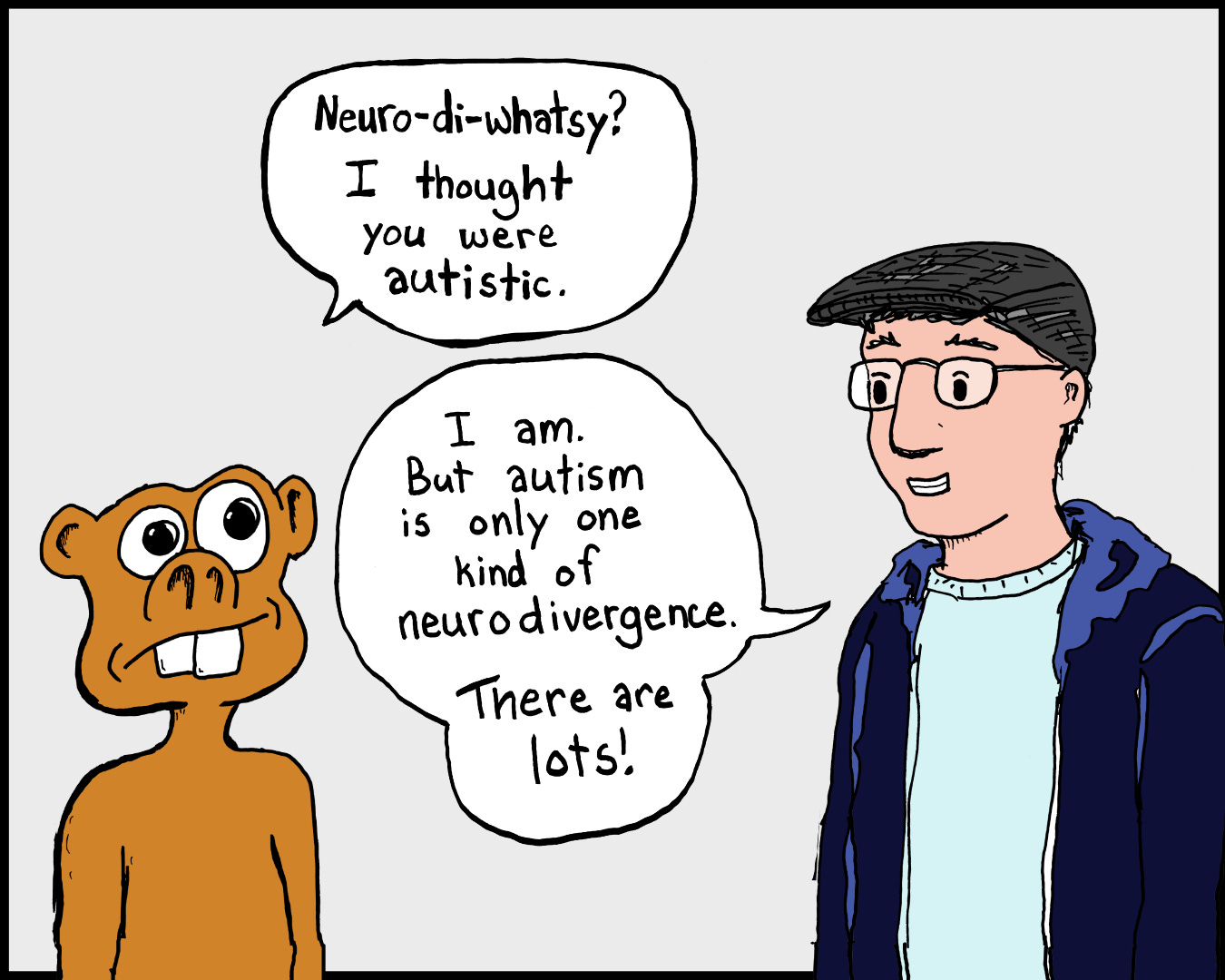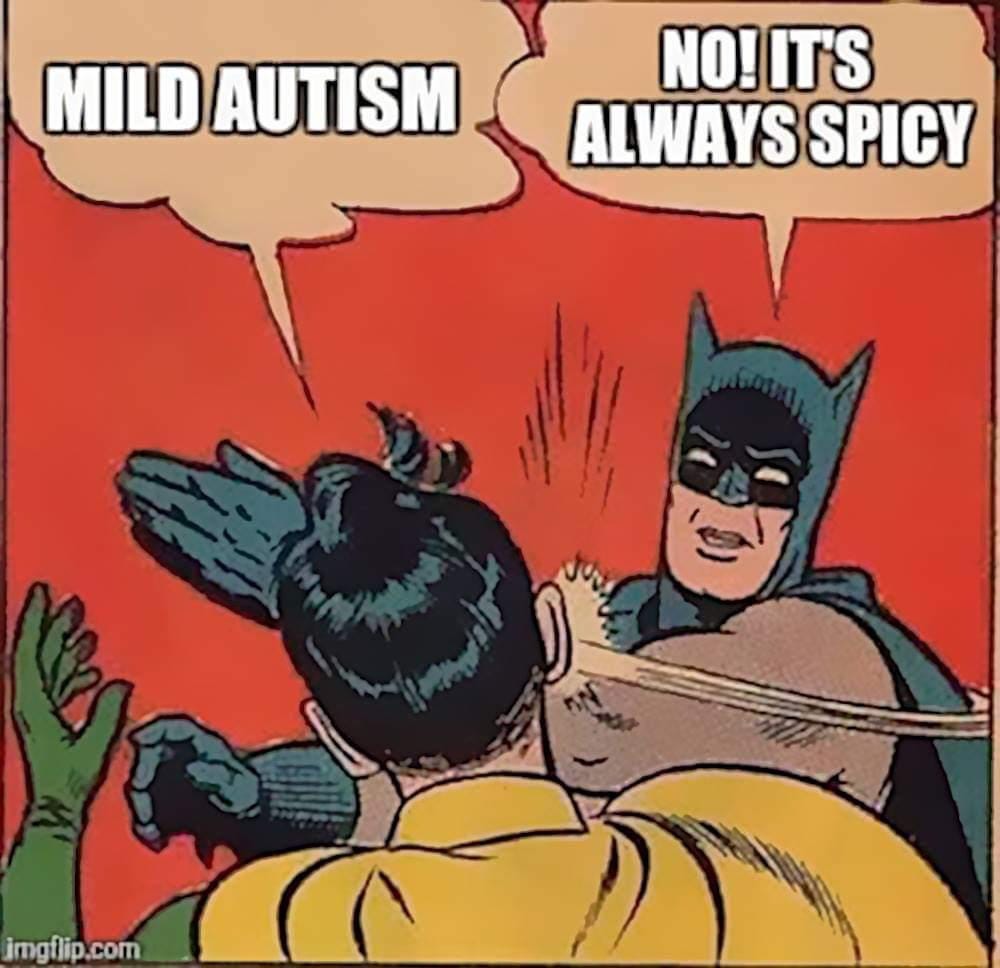Neurodivergent is an Awesome Word
a mini primer for those confused about all the "neuro-" words
Good morning, afternoon, whatever. I missed some sleep last night, but that’s par for the course. Being neurodivergent often means the sleep patterns aren’t always dependable.
Today I wanted to take a minute to address a question I keep seeing pop up on Threads. A lot of people are wondering if it’s better to refer to themselves as neurodiverse as opposed to neurodivergent.
So, the pedantic hyperlexic strain of my autistic nature is really wanting to run wild on this one in the most annoying way. I’m going to try to keep that in check, though, because it occurs to me that pedantry might be a really efficient way to alienate potential readers. Luckily, I took that college class on Linguistics and Social Issues thirty years ago which introduced me to the concept of descriptive grammar. I’ll be trying to hew to that perspective rather than clinging to the lost cause of lexical orthodoxy. (But, seriously, only heterogenous plural noun groupings can be diverse. A singular noun by itself is completely and utterly homogenous. So it follows that neurodiverse is a word that would describe a plural group of people, not a singular individual).
Now that I’ve established that I know a thing or two about words, let’s look specifically at a few of my favorites and how they came to be.
—neurotypical— Back in the mid 1990s and the early days of the old Asperger label, a lot of newly diagnosed people also happened to be pretty savvy with this newfangled internet thingie. BBS chats and email groups sprang up among autistic people excited to finally connect with other members their scattered tribe. It was among these online groups that the word ‘neurotypical’ emerged as a tongue in cheek teasing term that autists used for non-autistic people. Now it’s not so much a slur as a simple statement of fact. A large proportion of humans (80%-85%) have brains that operate very similarly to each other. They are the neurologically typical majority. Calling someone neurotypical simply means they are not neurodivergent. There really isn’t any negative bias inherent to the word itself.
—neurodiversity— Was a more refined concept that arose organically in those 1990s era online chat groups. (No, Judy Singer didn’t coin the term. She was just the first person to use it in an academic paper.) As people with Asperger and autism diagnoses connected, they recognized the variation of the expression of autistic traits among themselves. Originally the concept of neurodiversity only included people who fit into the diagnostic categories of the emerging concept of the autism spectrum. Neurodiversity has since grown to even larger and more vague proportions since then. I don’t mean the word ‘vague’ as something negative. It’s just not very specific. Today neurodiversity simply means recognizing that, as a species, there is a natural variation to how human brains work.
In this sense, neurodiverse is a word that is best used to describe a group of people with varied neurotypes.
—neurodivergent— The words “neurodivergent” and “neurodivergence” were coined by Kassiane Asasumasu around the year 2000. Asasumasu was diagnosed autistic as a child and is also epileptic and suffers from PTSD related to ABA therapy in childhood. She created the word because she found it off putting that people were starting to use the word “neurodiverse” as a euphemism for autistic. First, there’s the obvious grammatical nit to pick that an individual cannot be diverse, only groups are diverse, so calling an individual ‘neurodiverse’ is just grammatically cringey. But, more importantly, is the awareness that words matter. Using euphemisms to not talk about specific diagnoses only feeds the misinformation cycle. You can’t advocate for yourself or others if you limit your language to euphemism.
Since the beginning of its usage, the term neurodivergent was intended to include anyone who differs neurologically from the neurotypical majority. It has always included the entire autism spectrum, ADHD, OCD, Tourette Syndrome, dyslexia, Down syndrome, traumatic brain injury, PTSD, and many more. Basically, anyone whose brain processes the world differently from that 80% to 85% neurotypical majority is neurodivergent. It’s a positive and intentionally inclusive word.
–neurodivergency– This is a newer term that I picked up from a Londoner. Maybe it’s more of a UK term than an American one. Maybe it’s catching on. Basically, it’s a good term for indicating a specific type of neurodivergence. ADHD is one neurodivergency. Autism is another neurodivergency. Multiply neurodivergent people have more than one neurodivergency. I love talking about neurodivergencies because it makes me feel fancy and vaguely British. It could be that I’m still unclear on the usage of this term. Please feel free to roast me in the comments for it.
–neurospicy– Neurospicy is slang. It definitely lives in the euphemism real, which gets points deducted by me. At the same time, I hardly ever like to remove words from my arsenal (there are a couple I definitely don’t use. You can probably guess which ones). The thing I like about ‘neurospicy’ is that it reminds me of a meme that came out when the DSM 5 was a wee baby. There was a hot minute when the new autism level 1 diagnosis was described as “mild autism.”
And the reaction was “No! It’s always Spicy!”
Neurospicy seems to have become a label ADHDers in particular like to self apply and run with. Its usage is often playful and carries with it a sense of pride and self-worth. I like when people are having fun with language in a way that’s not intended to hurt others.
At the same time it may be that “neurospicy” is a term that works best in an American context. The curator of the Instagram account @muchmuchspectrum, who is based in India, took issue with the term in a post, as it just didn’t make any sense to her from her cultural standpoint.
In the end, none of these words are bad or wrong, they just carry different nuances. Also, I am going to be that guy. I have to remind everyone that many neurodivergent individuals have communication difficulties. This from missing nonverbal cues to having unreliable speech to being nonspeaking. And then there’s dyslexia and dysgraphia, if we want to get into how the written word can be problematic as well.
I have somewhat unreliable speech myself. I lose my words, or, more often, mix up related words. (It’s a fifty-fifty chance that I will say ‘left’ when I intend to say ‘right’.) As pedantic and linguistically uppity as I can be in my own mind, I know that it’s a fight for me to get a sentence out of my mouth sometimes. In fact, for the longest time, a younger, more self-conscious, me would just remain silent if I didn’t know what the most precise words were to communicate something.
Knowing this, I give a lot of grace to people who use the not quite perfect word in the conversational moment. I rarely ever question a person’s word choice if I can understand their meaning. There are exceptions, and I try to do it ever so gently and with understanding. Like, I totally get why people will mistakenly use the abbreviation BPD when they’re talking about bipolar. (For the record BPD is borderline personality disorder. It’s a different thing altogether from bipolar, and trying to medicate it with mood stabilizers is not going to help much.)
So, from my sleep deprived substack ramble, let me leave you with this. The word neurodivergent was created as a useful, inclusive, and broad term that simply means ‘not neurotypical.’ It’s a perfectly good word and it isn’t a euphemism for anything. Calling yourself neurodivergent is awesome, especially if you’re doing it from a place of self knowledge and pride. Calling yourself neurodiverse is awkward and someone far more pedantic than myself might give you some sass about it.
Thanks for reading. I’ll ramble at you all again in a couple weeks.
-Andrew, AKA Partly Robot




